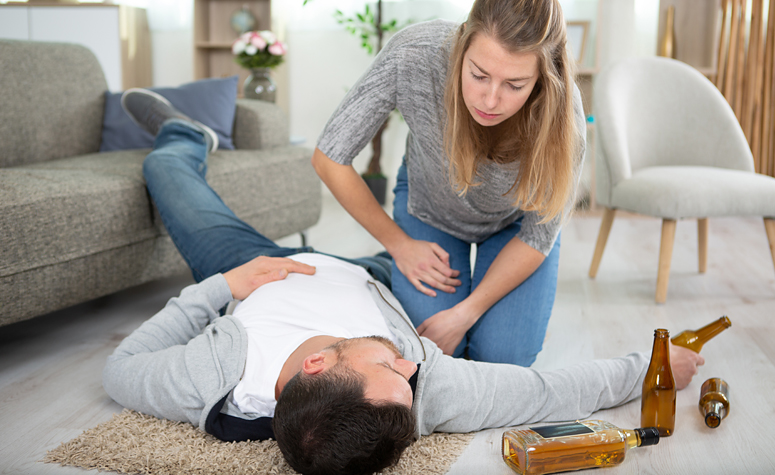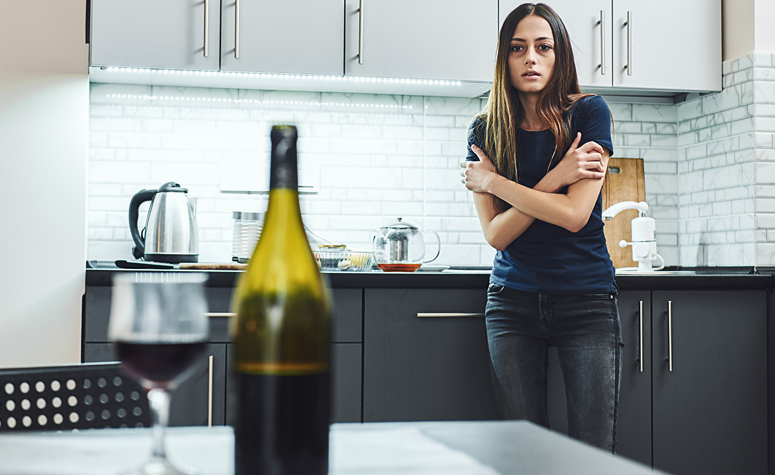What is Alcohol Relapse Prevention?
In an alcohol addiction programme, one of the crucial parts of the treatment is relapse prevention. Its goal focuses on disrupting the cycle of abuse through understanding the triggers, behavioural cues, and motivators that drive the patient to drink.
This treatment also includes educating the patient with healthy coping skills that steer them away from going back to the comforts of alcohol. This means that the priority is uncovering the personal triggers that patients undergo. When relapse prevention treatment starts, the focus is changing the pattern of abuse and helping the person create new pathways for healing.
Relapse happens in several stages, and relapse prevention helps patients identify what current stage they’re at and how to deal with it. Identifying the early warning signs is crucial, as relapse can happen way before the person picks up drinking again.
Relapse usually starts with poor self-care, which can appear as:
Relapse prevention mitigates these warning signs through therapy and helping patients deal with their stressors healthily.

Common Causes of Relapse and Relapse Prevention Plans
The common causes of relapse are emotional and mental. With emotional relapse, it imitates the common symptoms of post-acute withdrawal syndrome (PAWS). These symptoms are usually anxiety, depression, fatigue, mood swings, or anger.
When emotional relapse happens, the person is undergoing the same emotional distress they experienced when they were drinking before the treatment. The key is identifying early warning signs like isolation and avoiding support to prevent it.
In this stage, there are multiple ways to cope. For example, when anxiety comes up, practising relaxation techniques helps. If it’s poor sleeping and eating habits, the focus should be taking care of physical health. In this sense, taking care of the person’s overall health helps them prevent relapse far better compared to when they’re dealing with anxiety and poor physical health.
Mental relapse is the next stage that happens. This is when more intrusive thoughts pop up as it progresses. In this stage, the person convinces themselves that they have control over their alcohol use.
They will start to have thoughts that they won’t drink to excess and can even just take one drink only and then stop or moderate their drinking.
They’ll also start seeing drinking buddies again or return to their favourite spots for drinking. They begin to glamorise their life before when they’re abusing alcohol and will find it more enticing to go back to.
In mental relapse, the mind plays tricks on the individual and rehashes the typical lies of addiction. During this stage, it’s crucial to debunk this way of thinking by confiding with a trusted friend or advisor about their desire to use alcohol again. This can help them disrupt the circular thinking they have fallen into during relapse.
Below, you’ll find the other common factors that cause alcohol relapse.

Stress
Stress is a common trigger that disrupts people’s recovery. It can morph into anger, frustration, or feelings of helplessness. Whether it be stress in the workplace, unhappy home life, or personal issues, stress can be one of the main drivers that pushes them to start drinking again.
The danger of using alcohol to soothe and relax one’s mind is that it can condition the brain to depend on alcohol for relief. This can develop into alcohol abuse again when the only coping mechanism is drinking.
This is why developing a healthy coping skill toolkit is crucial to prevent relapse. This can take the form of simple exercise to release good hormones to boost energy, mindful activities like guided meditation recordings specifically designed for alcohol users, and brisk walking to help clear the mind.
The key is to find many healthy coping skills to ease their mind off the stress. When they don’t have any other wind-down activities to go to, this can make alcohol use much more enticing as it can become their default de-stressor.
Old social circles
Spending time with a friend group that still actively drinks can trigger relapse due to peer pressure or out of habit. This is why it’s ideal to set boundaries with old social circles to prevent any possibility of relapse. This is crucial, especially during the early stages of recovery, as the individual can still be vulnerable.
This can be challenging as it means less time socialising. This is also why most alcohol addiction treatment plans include meeting support groups to navigate the nuances of living without using alcohol after recovery. This helps them feel less shame and supports them in moving forward better.

Fast Access to Residential Treatment
We are currently able to offer fast access to private inpatient treatment.
Please call us today and speak to one of our expert advisors.
Call in confidence: 0800 0148 970
Old hangout locations
Visiting old hangout places where the individual used to socialise and drink can tempt them to return to having “one” drink. Addiction is formed through habits, and when the person goes back to their habitual places, this can act as a powerful trigger.
During a mental relapse, old hangout locations can be glamorised by the user. They will then have thoughts that they can control their alcohol consumption and can easily fall back into the cycle of abuse.
In recovery plans, the person is often advised to take different paths from work or find new spots without alcohol to go to for socialising or relaxing.
Negative or challenging emotions
A good reminder of negative emotions is the HALT acronym. These are when you feel hungry, angry, lonely, or tired. Most people who have resorted to alcohol as a coping mechanism start it because they are not able to face or deal with these negative emotions healthily.
When HALT emotions run high, it becomes challenging not to spiral back to negative thought patterns. Without healthy coping skills, negative emotions will only dictate a person’s life and lock them in place with the vicious cycle of abuse.

Seeing or sensing the object of your addiction
Fighting against addiction requires more mental strength; however, the physical reminders of the object of addiction itself can be a dangerous trigger. This means seeing, smelling, or holding a frosty beer bottle can become risky.
In mental relapse, the users often start to believe they have regained control and can start drinking again. Seeing the object of their addiction will only reinforce this false belief and lead them to use alcohol again.
This is a slippery slope after recovery, which is why relapse prevention techniques should be learned to stamp down these triggers effectively. When people are armed with these techniques, they can resist, for example, by ordering a drink when they see one in a commercial or the grocery aisle.
Big parties and celebrations
It’s highly common that most celebrations or parties have drinks to toast to. Most patients are advised to avoid these events during recovery as they can become potential triggers. However, if there’s no way around it, relapse prevention techniques can help them resist the temptation of alcohol.
The best alternatives during these events can be leaving the event early or drinking non-alcoholic beverages instead. Another way is to talk to friends who don’t drink to help you support them. Verbalising your worries and also your firm stance on not drinking after rehab treatment can help reinforce this healthy boundary.

Types and Stages of Relapse
The stages of alcohol relapse happen mentally and way before a person picks up their first bottle again. There are different prevention strategies for each stage of relapse, and it’s crucial to look out for the early warning signs to mitigate it.
In battling addiction, support from a community is vital in helping the user ease into their recovery journey. Having a community also helps them get relapse prevention immediately, as many people can also spot cues of relapse.
Relapse has three stages, and each stage requires specific strategies that the user is taught way before they experience the first signs of relapse.
Emotional relapse
In treatment, alcohol withdrawal is bound to happen, it is part of the recovery and treatment process but it can affect the user emotionally.
Feelings of depression or anxiety come up, but as the treatment develops, it also fades away. The risk is that strong negative emotions can still trigger a relapse when there is poor self-care.
When emotional relapse happens, understanding the underlying triggers can immensely help the individual stop responding to alcohol to escape unwanted emotions. Cognitive behavioural therapy, journaling, and physical activities are just some of the prevention strategies to help reduce emotional relapse.
Mental relapse
Mental relapse is a “war” of the mind at this stage. The person starts to believe that they can use alcohol again. There’s a false belief that they do have control over their drinking and know when to stop – intrusive thoughts like glamorising their past life with alcohol become the focus.
In this stage, it is crucial to challenge these thoughts since it only intensifies cravings. Reminding the individual of the realistic adverse effects that their addiction inflicted on their life is essential. The key is to help them remember their “why” in seeking treatment in the first place so they don’t reminisce and glamorise the past.
Physical relapse
This stage is when the user finally takes their first sip of alcohol. This can be a momentary relapse or a full one where they repeat the same harmful pattern of alcohol use they previously did.
Physical relapse is the height of relapse where emotional and mental relapse have reached its peak. This is why people with physical relapses can find it hard to say no when the opportunity for a drink arises. It’s even more crucial to have strategies in place during this stage.

Fast Access to Residential Treatment
We are currently able to offer fast access to private inpatient treatment.
Please call us today and speak to one of our expert advisors.
Call today in confidence: 0800 0148 970
Coping skills training
This includes skills training to help the user wind down or relax during stressful situations that can trigger a relapse. The skills each user will develop are different; some find meditation better, while others find feeling the emotions healthier. Others can find solace through hobbies and physical activities, and some find cognitive thinking strategies far better in helping them deal with their triggers.Cognitive behavioural therapy (CBT)
Cognitive behavioural therapy helps the person create new mental and emotional pathways to help them get out of their thought spiral. Disrupting or redirecting negative thought patterns brought by depression or anxiety is often dealt with here. The key is to educate them on new ways to reframe their thinking.
In this kind of therapy, they will identify what negative thought patterns led to their substance abuse. How to deal with stressful situations without mindlessly reacting and reaching for another beer bottle. They will also learn how to redirect adverse reactions that come in more healthy ways.
Lifestyle modification
Changing lifestyle choices can help the user easily create better and healthier choices. When they are not exposed to the same conditions that led them to their substance abuse, they will find it easier to resist old habits and negative thought patterns.
Lifestyle modification includes:

What are the Biggest Rriggers for Relapse?
Triggers for relapse often come in the form of internal thoughts or external factors. These are often the deep underlying reasons why the individual resorted to alcohol abuse in the first place.
Working with a therapist is essential during relapse prevention so they can catch themselves when the same thought spirals come up and healthily deal with them. During therapy, they can build their toolkit of strategies to help them redirect their thoughts or act differently in front of the trigger.
Internal triggers come in the form of emotional responses during stressful situations. They often come up as fear, shame, anxiety, or guilt. When confronted with the same emotions, it often becomes instinctive for them to go back on their previous coping pattern out of familiarity. It’s either done to dull the pain or soothe their anxiety.
In therapy, the user works with the therapist to understand the reasons behind these emotional responses. Most of the time, they are rooted in trauma, and this is where their coping skills can be highly valuable.
External triggers, on the other hand, include:
- Old hangout spots
- People like drinking buddies
- Even physical objects like a cold iced beer bottle

Sobriety is not about giving something up
It’s about taking everything back
Knowing and understanding your triggers
The best way to understand one’s triggers is through honesty. Uncovering what drives them to drink takes an immense amount of honesty with oneself. It can look different from person to person; there’s no one size fits all.
For example, not all users resort to alcohol use when they are upset or only feeling negative emotions. Some have conditioned themselves that alcohol is a reward, and they might be prone to drinking because of their celebratory state.
Understanding how an individual’s emotions and thought patterns react to the object of addiction is very helpful in forming new pathways for healing. It demands honesty from the user, and this will eventually help them have an increased awareness of their alcohol use and deal with stressful situations.
What do I do if I Have Relapsed?
There’s no shame in relapse, as it is fairly common. Addiction is an unkind beast that can be challenging to face. The changes after treatment and sobriety can be challenging for most users, which is why over 50% of them relapse. Some of them experience momentary relapses before recovering fully.
The first and most crucial step in relapse recovery is being prepared for the shame and guilt that come when one goes back to alcohol use. There is often a specific kind of shame when a user briefly slips up, which is why they may resist asking for support. Accepting these feelings makes it possible to go to the next step, asking for help. This can come in many forms, like joining support groups with users in recovery, addiction counselling, and therapy.
Treating relapse can vary depending on the length of the usage. Most of the time, medically assisted alcohol detox is crucial for these individuals as withdrawal symptoms can turn life-threatening if done alone.
What is a relapse prevention plan?
A relapse prevention plan (RPP) is a treatment that focuses on identifying internal and external triggers of the user that led them to alcohol abuse. The emotional and mental patterns are examined, and individuals are educated on different prevention strategies before finishing their treatment.
There are five vital steps for a successful relapse prevention plan. These are:
- Self-awareness and reflection that led to alcohol abuse
- Personal triggers and early warning signs
- Developing a worst-case scenario plan and techniques to combat them
- Getting the help of a support system (family or friends) so they won’t feel alone
- And lastly, setting goals to achieve a healthy lifestyle
A solid foundation on which to build long-term recovery
A solid foundation to fall back on is crucial for people recovering from alcohol addiction because it’s this same reason that led them to where they are in the first place. When there’s no solid foundation for them, it only perpetuates the same internal triggers like feelings of helplessness and a loss of self-worth.
Like any building, having a solid foundation is the first crucial step to build so that their journey towards recovery becomes stable and successful. This is done through working with a therapist and exploring ways to build it.
How to Develop a Relapse Prevention Plan
A relapse prevention plan is usually prepared with the help of a trained addiction therapist. Together, the individual and the professional pinpoint the internal and external triggers that lead to their addiction. The next step will be creating actionable strategies during stressful situations and uncovering personal histories and trauma that are attached to these triggering scenarios.
What you will learn about relapse prevention in rehab
In rehab, the users are also educated about the three stages of relapses and are supported through arming them with prevention strategies. This can come in the form of healthy practices like journaling, exercise, and other healthy choices.
Without aftercare, most people run the risk of experiencing relapse. This is why they must develop these skills first before leaving treatment.
Many people going through relapse prevention in rehab learn to take each day one at a time. The goal is to focus on daily acts of mindfulness and practising healthy coping skills. Taking it one day at a time means they are creating a series of small but healthy decisions that build up to a life free from addiction.

Properly Managing Your Sober Time
For most newly sober people, the absence of drinking in their lives will make them much more self-aware of how much time they have on their hands. As constant alcohol use can dull their time, they might find themselves not knowing what to do with the available time they have now.
Boredom, loneliness, or force of habit can trigger them to go back to drinking again. This is why it’s important that having hobbies and other time activities for self-improvement are crucial to adopt after treatment. When people can manage their sober time through planning, they can feel more secure and in control of their lives rather than going back to habitual drinking to fill up their days.
Mindfulness practice
Alcohol addiction is often caused by avoidance. Avoiding negative emotions like fear, helplessness, pain, or boredom by dulling them with alcohol. But with sobriety, it requires the person to be present. Staying present in the moment means fully experiencing joy in experiences they derive pleasure from. It also entails being present and working actively when fear, anger, and other uncomfortable emotions arise.
In this way, mindfulness practice can be highly valuable for the person in relapse prevention therapy. This helps them develop new coping strategies to implement when faced with the same patterns. This can include breathing exercises, stillness, and understanding the value of taking a pause before reacting. It can seem simple on paper, but it’s pretty challenging to practice; this practice can help users avoid the same debilitating patterns that led them to addiction.

Physical therapy and healthy eating habits
Nourishing the body by eating well and exercising is crucial to rebuild the body and the brain. In treatment, alcohol creates a chemical imbalance in the body. When it is detoxified from the system, it will take a while for the brain and body to rebalance fully. Developing healthy eating habits and regularly exercising can heal the user from the effects of alcohol significantly.
Regular exercise decreases stress, and a healthy diet, on the other hand, can help them feel energised. Taking care of the brain and body ultimately supports them in living a healthy life free from the harmful effects of alcohol addiction.
The role of counselling in relapse prevention
Once the individual leaves the alcohol rehab centre, they are still supported through aftercare and counselling. This is crucial since they won’t necessarily be left alone to deal with the stressors in their life. Regular counselling sessions can help them improve RPP and can also help uncover less apparent triggers.
Counsellors during these sessions help them deal with their emotions not just in the theoretical sense, like brainstorming scenarios, but with real-life situations. The key here is that they have a safe space to talk about their emotions and also when they feel like a relapse is coming in.
FREE Alcohol Addiction Assessment
If you or a loved one are struggling with alcohol addiction, we understand the challenges you’re facing and we’re here to offer compassionate help.
Our highly trained advisers are available to speak to you right away, simply call 0808 252 3379 today.
We can discuss your concerns in complete confidence, explore the options for treatment, and help you to understand what will work best for you.
We’ll also help you to book your free alcohol addiction assessment there and then, with appointments usually available within only a few days.
We understand that taking the first step can be the most difficult, but we’re here to support – with no pressure or judgement.
Professional and compassionate help is just a phone call or click away.




